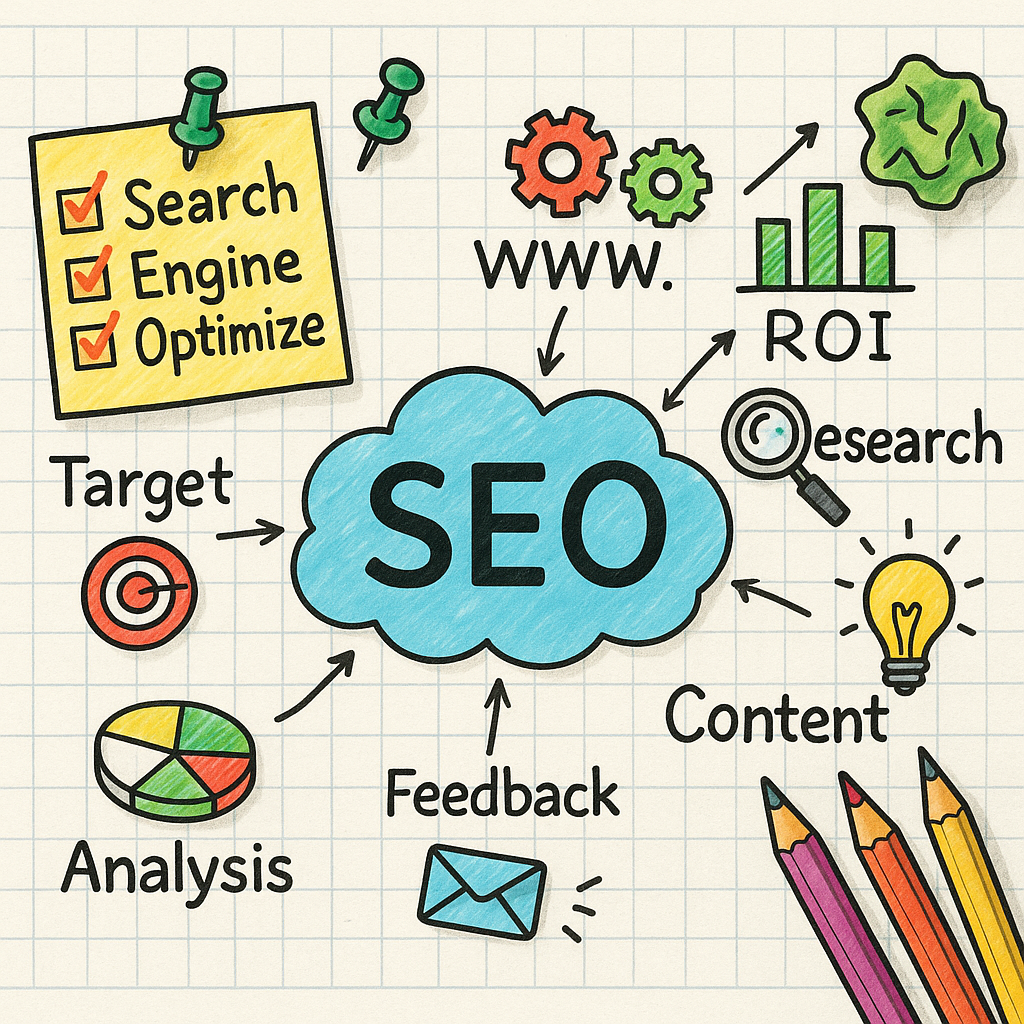Hey there! Still leaning on those tired old SEO strategies from 2023? And now, Google’s updates for 2025 is here, and those old keyword tactics may be giving way to more up-to-date strategies. With the advent of voice search, AI snippets, and zero-click results, that landscape is changing. No need to worry — you don’t even need a magic wand. Five simple, smart changes can crush the rankings, and drive traffic to get to the top. Ready to get ahead of the algorithm? Let’s dive in!
AI-Powered Content Optimization
⁍ Make the most of AI tools for content analysis and optimization
You can use tools like Surfer SEO or Clearscope to scan your content for SEO weaknesses, such as readability issues or missing keywords. These AI tools evaluate your drafts and offer suggestions—think about improving headings, meta tags, or internal links.
⁍ Use natural language processing to grasp search intent
NLP helps you understand the reasons behind user searches (like “how to fix a leaky tap” versus “best plumbing tools”). Tools such as MarketMuse or Frase can assist in aligning your content with what users are genuinely looking for—categorizing queries as informational, commercial, or navigational.
⁍ Adopt AI-driven keyword clustering techniques
Group similar keywords (like “vegan recipes” and “plant-based meals”) to cover broader topics. Tools like SEMrush’s Keyword Magic or TopicRanker can help you organize long-tail phrases, so you don’t end up writing ten articles when one solid pillar post will suffice.
⁍ Leverage machine learning for content gap analysis
Machine learning tools like Ahrefs or BrightEdge can compare your content against competitors’ and pinpoint gaps. They’ll flag missing FAQs or underrepresented subtopics, giving you a clear idea of where to expand to outshine the competition.

Technical SEO Performance Boosters
⁍ Put core web vitals optimization strategies into action
Speed up your site by addressing slow-loading images (LCP), minimizing layout shifts (CLS), and enhancing interactivity (FID). You can use tools like Google PageSpeed Insights to identify issues—think lazy loading or font display swaps.
⁍ Create lightning-fast mobile page load times
Mobile users generally bounce if it takes longer to load a page than three seconds. To speed up your site, reduce the size of your images with the WebP format, use accelerated mobile pages (AMP) for longer pieces of content, and trim away unnecessary code. Don’t overlook server response times — you can optimize these by using caching plugins.
⁍ Create advanced schema markup implementations
Don’t settle for just the basics! Elevate your product schemas by adding FAQ snippets for voice search, how-to guides for recipes, or event markup to improve your local SEO. You can inject structured data through JSON-LD and validate it using Google’s Structured Data Testing Tool.
⁍ Optimize for Google’s latest algorithm updates
Make sure you’re aligned with the 2025 Helpful Content System by focusing on EEAT—experience, expertise, authority, and trust. Remember, thin content won’t cut it anymore, so it’s essential to rewrite those shallow posts and fix any broken links. With updates happening monthly, regular audits are key!
Advanced Keyword Research Techniques
⁍ Move beyond traditional keyword research methods
Forget about just looking at basic volume and competition numbers—tools like AnswerThePublic or LSIGraph can help you discover question-based keywords and related topics. It’s all about
building content around themes rather than just focusing on standalone terms.
⁍ Utilize semantic keyword clustering
Organize keywords by their meanings (for instance, “coffee brewing methods” paired with “pour-over techniques”) using tools like SEMrush’s Keyword Magic. These clusters enable you to dominate entire topics instead of just ranking for a single phrase.
⁍ Explore long-tail and intent-based keyword strategies
Aim for very specific phrases like “best budget DSLR camera for beginners”—they usually have low competition but high intent. You can categorize searches as either “informational” or “commercial” by checking out Google’s People Also Ask for insights.
⁍Leverage user intent mapping for content creation
Make sure your content aligns with what users are genuinely looking for. Tools like MarketMuse can analyze top-ranking pages to help you understand intent—create guides for “how-to” questions or comparison charts for “vs” keywords.

Visual Recap: 2025 SEO vs. Traditional SEO
| Factor | Traditional SEO | 2025 SEO Hack |
| Content | Keyword density | AI-optimized, intent-focused |
| Search Type | Text-based | Voice + video prioritized |
| User Experience | Mobile-friendly | Core Web Vitals 90+ score |
| Credibility | Basic backlinks | E-E-A-T + expert partnerships |
High-Converting Link Building Strategies
⁍ Develop linkable asset creation techniques
Link magnets, such as free tools like ROI calculators, niche guides, or infographics, are created to attract attention. Tools like Canva or Google Sheets templates are particularly effective—people love sharing these resources because they’re genuinely helpful.
⁍ Implement white-hat outreach strategies
Personalize your emails with tools like Hunter.io—point out a broken link on a site or suggest a relevant guest post. Building relationships takes time, so avoid spamming. A little tip: use Pitchbox to keep track of your replies.
⁍ Create content that naturally attracts backlinks
Publish original research, like a “2024 SaaS Trends Survey,” or insightful case studies. Journalists and bloggers are more likely to link to fresh data—tools like Ahrefs’ Backlink Gap can show you what’s already working.
⁍ Analyze and reverse-engineer competitor link profiles
Enter their URLs into Ahrefs’ Site Explorer to find out who’s linking to them. You might discover broken links on their older posts that you can claim, or spot guest post opportunities where they’ve already made a mark.
Voice Search and AI Search Optimization
⁍ Optimize content for voice search queries
Voice searches often sound like questions, such as “How do I fix a leaky tap?” To optimize for these, focus on long-tail keywords and provide straightforward answers in just a couple of sentences. Tools like AnswerThePublic can help you find those common spoken queries.
⁍ Understand natural language processing implications
AI, such as Google’s BERT, interprets content based on context. So, when you answer “who, what, why” questions, keep it clear and avoid jargon. Short sentences and a sprinkle of synonyms can really help AI grasp your content better.
⁍ Create conversational content strategies
Write as if you’re having a conversation with a friend. Use “you” and “I” to keep it casual, and steer clear of stiff language. For example, say “Here’s why your AC is noisy” instead of the more formal “Common HVAC issues.” Tools like Frase can help you gauge how easy your content is to read.
⁍ Implement FAQ and featured snippet optimization
Lastly, when optimizing for FAQs and featured snippets, structure your FAQ pages to directly address “who, what, where” questions using bullet points or numbered lists. Aim for snippet triggers like “best way to…” with concise answers, as this can help you snag that coveted “position zero” spot on Google.

Boom—you now know five SEO hacks that will make 2025 yours! PSA: SEO is not a “set it and forget it” endeavor. You’ll also have to continue to refine the schemas on your FAQs, your AI content clustering, and on predictive keyword models as Google continues to change things. GA4, AnswerThePublic are your best friends today on this trip. Keep on your toes: test, track and repeat. And that rival looking to slip ahead of you? Chances are, they’re reading this too!
FAQ’s
Q1: What’s the #1 SEO hack for 2025?
A: Focus on E-E-A-T. Google prioritizes trustworthy, expert content over generic posts.
Q2: Will AI replace SEO?
A: No—AI is a tool. Use it to streamline research, but human creativity wins rankings.
Q3: Is voice search worth the effort?
A: Absolutely! 55% of households will own smart speakers by 2025. Optimize or get left behind.
Q4: How soon will I see results?
A: Most hacks take 3-6 months. Consistency is key—update content monthly.
Q5: Biggest SEO mistake to avoid?
A: Ignoring page speed. Slow sites rank lower, even with great content.
Liked these hacks? Subscribe for our free 2025 SEO Checklist—or share your #1 tip in the comments!










